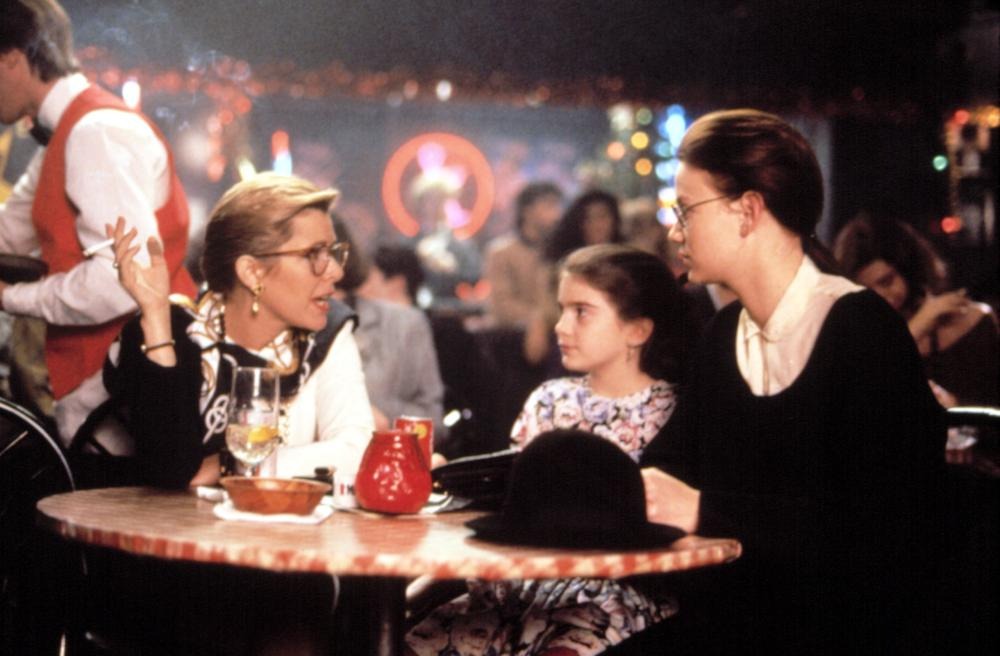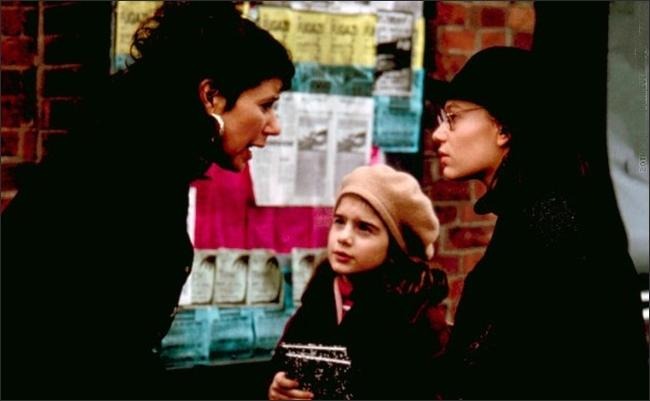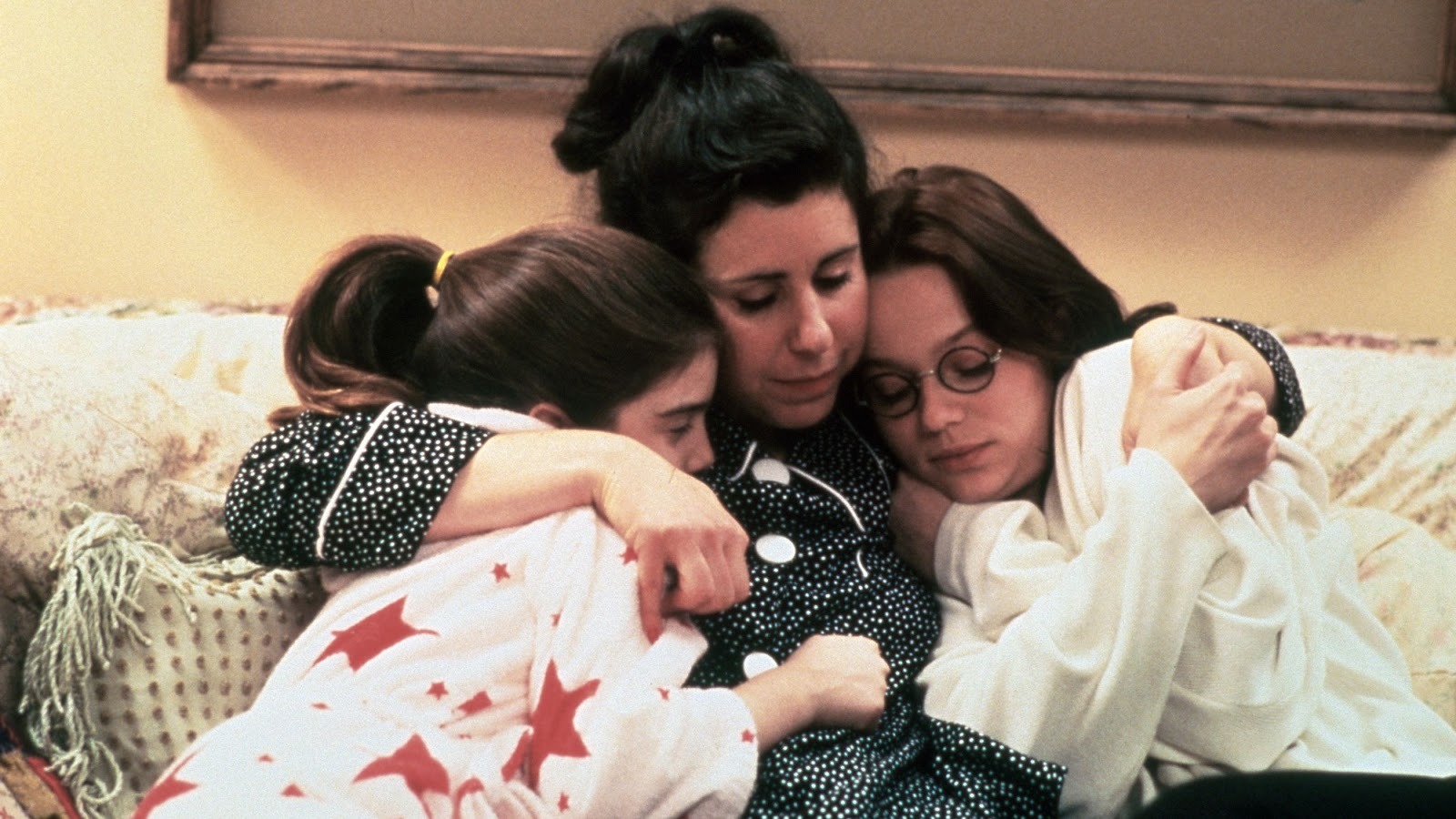All girls are either Betty or Veronica. “This is a very important thing to understand,” says Mia, one of several babysitters hired by Dottie Ingles to look after her daughters while she tries to make it big at The Comedy Shop in Los Angeles. “Veronica always gets the guy—or whatever she wants—and Betty always wants whatever Veronica gets.”
Opal, ten, vivacious and popular, asks, “Are you a Betty or Veronica forever?”
“No,” says Mia. “A Betty can grow up to become a Veronica. Look at your mom.”
The possibility of blossoming later in life and becoming a Veronica might be good news for Erica, fourteen, a loner with a bad habit of chewing on her hair—if she didn’t see her mother’s newfound success as a terrible inconvenience.
Nora Ephron’s directorial debut, This Is My Life (1992), tells the tale of the Ingles women. When their beloved Aunt Harriet dies, she leaves her Queens home to niece Dottie. Without hesitation, Dottie sells the house, cashing in to pursue a career as a stand-up comedienne in Manhattan. It’s a lovely film that nobody ever talks about. It’s never mentioned in the countless op-eds on Ephron’s legacy, not seen by the masses—probably not even by those who watch Sleepless in Seattle every Christmas—and it wasn’t available on DVD until 2012, as part of the FOX Cinema Archive series following Ephron’s passing.

It was a box office bomb, and Jon Peters, the former head of Columbia Pictures, didn’t even read the script. The first has nothing to do with the second: Peters told Ephron, “He had made 65 movies and had never once read a script, and he wasn't going to start now.” He asked if she could tell him about the movie. I can’t imagine how Ephron sold him the project: a woman-led picture, a starring vehicle for Julie Kavner who is otherwise known as the voice of Marge Simpson, about a single mother juggling her artistic ambitions with her domestic duties, a reversal of the marriage plot without the wish fulfilment of happily ever after.
Perhaps Peters had been distracted by the Swedish model, Vendela who was at the meeting, or maybe he was convinced by Ephron’s extensive resume. She was a two-time Oscar nominee who’d worked with some of the most successful filmmakers of the time—Rob Reiner and Mike Nichols—and some of the era’s biggest stars—Meryl Streep, Jack Nicholson, and, of course, Meg Ryan. Ephron had acquired an extensive, hands-on film education all before her debut, and for that reason, This Is My Life doesn’t feel like a director’s first film. Peters signed off on the project, seemingly convinced by Ephron’s summary. Meanwhile, she thought their encounter had been a total nightmare. She couldn’t believe that her life was in the hands of this person.
"The most singular throughline across Nora Ephron’s work—more so than any meet-cute or grand gesture—is her love of these women: the oddballs who wield their own fate."
Dottie Ingles’ life is also at the mercy of showbiz whims. Her stand-up comedy career takes her far away from Erica and Opal for weeks at a time. Living without their mother for the first time in their lives infuriates the girls. Dottie’s distance drives the girls crazier when they witness her share stories about them on talk shows. The girls understand that artists borrow from their own lives, but the lives of their children should be off limits. Dottie apologizes, saying, “It's just that our lives are all tangled up together.” Really, Dottie’s worst crime is trusting a male comedian to babysit. Although the film is partially narrated by Erica (and by Dottie herself), it never casts moral judgment on its characters. In Nora Ephron’s world, everybody is entitled to their flaws.
I’ve been single for the past few years, and a stand-up comic for a little less than that. During my singledom, there have been an endless string of first dates, the rarer occasion of a second date, and the conflicting hope that maybe everyone is right and “it” will happen when I least expect it. There has been sex. Sometimes, I seek it out. Other times, I won't shave my coochie or my butt to discourage myself from having it, which really just means that I’ve had a lot of sex with hairy coochie. No man makes me feel as good as I do when a small crowd erupts in hysterics over one of my punchlines. Dottie Ingles is a similar woman.
This Is My Life arrived a decade after Heartburn, the story of Ephron’s marriage to journalist Carl Bernstein of Watergate fame—or, more precisely, the story of its unravelling, when she discovered he had been having an affair while she was seven months pregnant with their second child. The silver lining of that scandalous and highly publicized divorce was that Ephron was free to leave Washington, D.C., the city where Bernstein worked, and return to New York, to the same West Village where the Ingles women ventured to start anew. This debut is what comes after you’ve loved and left, and after you’ve found love again.
"This debut is what comes after you’ve loved and left, and after you’ve found love again."
Dottie starts a relationship with her high-profile agent, “The Moss,” played by Dan Aykroyd. Ephron, on the other hand, married filmmaker Nicholas Pileggi, the man with whom she spent the rest of her life. It’s fitting, then, that the romance in this movie isn’t a magical, life-affirming event, but rather a quiet source of grounded contentment. The Moss eats paper—as in tissues from his pocket, the bill after he pays, and he looks unkempt, with his unbrushed hair and slouchy sweaters, but he understands Dottie’s career and helps take her to the top of her game.
The central criticism hurled at female comics is that we only talk about sex. In Dottie Ingles’ era, this insult was often aimed at the confessional comedy of housewives, whereas now it’s an attack on houseless sluts. I know I talk a lot about sex, maybe even too much, and I don’t care what you think about it, so long as you think it's funny. I attribute my blasé attitude in part to Ephron, as I have co-opted her philosophy: everything is copy. Dottie shares this belief. She tells her girls, “Take notes while I’m gone. Don't write letters. Letter writing is ridiculous. Nothing ever arrives within a week, and someone else ends up with what you should have: a record of your life.”
Dottie’s stand-up career unfolded the way I imagined mine would when I had nothing but a few open mic spots under my belt. It’s a fast-tracked fantasy where you experience no discrimination, no hazing, no contentious scene politics, and within a year, you’re on Johnny Carson. Still, this film remains on the short list of excellent films about stand-up comedy. We’ve all taken stress dumps inside comedy bar bathrooms. We’ve all dealt with audiences so dead they might as well be wearing toe tags. Despite her status as the queen of the romantic comedy, Nora Ephron understood women like me and Dottie because she was one of us.

Ephron’s career followed a more winding, albeit just as exponential, trajectory. She began as a journalist and Esquire columnist before becoming a screenwriter, then a director, and eventually even a playwright. As I watched this movie, I was reminded of one of Ephron’s earliest professional pieces—published in 1970, it’s one of my personal favourites—a profile on Cosmopolitan editor, Helen Gurley Brown, titled, “Helen Gurley Brown just Wants to Help.” In it, Ephron examines how Gurley Brown, a self-described Plain Girl, “decided the kind of person she wanted to be, the milieu in which she wanted to live, how she wanted to look,” and “in a very real sense, she invented herself.” Gurley Brown, like Dottie, like maybe even you or me, was a Betty who became a Veronica. The most singular throughline across Nora Ephron’s work—more so than any meet-cute or grand gesture—is her love of these women: the oddballs who wield their own fate.
I’m not sure if the 29-year-old Nora Ephron, writing that Esquire profile, was aware that she would also become somebody who just wants to help. In my final year of university, I watched Ephron’s commencement speech at Wellesley College, her alma mater. She addressed the women graduates in 1996, saying, “Maybe young women don’t wonder about whether they can have it all any longer, but in case any of you are wondering, of course you can have it all. It will be a little messy, but embrace the mess […] and rejoice in the complications.” In This Is My Life, Ephron shows her viewers what having it all looks like in practice.
All girls are either Betty or Veronica. “This is a very important thing to understand,” says Mia, one of several babysitters hired by Dottie Ingles to look after her daughters while she tries to make it big at The Comedy Shop in Los Angeles. “Veronica always gets the guy—or whatever she wants—and Betty always wants whatever Veronica gets.”
Opal, ten, vivacious and popular, asks, “Are you a Betty or Veronica forever?”
“No,” says Mia. “A Betty can grow up to become a Veronica. Look at your mom.”
The possibility of blossoming later in life and becoming a Veronica might be good news for Erica, fourteen, a loner with a bad habit of chewing on her hair—if she didn’t see her mother’s newfound success as a terrible inconvenience.
Nora Ephron’s directorial debut, This Is My Life (1992), tells the tale of the Ingles women. When their beloved Aunt Harriet dies, she leaves her Queens home to niece Dottie. Without hesitation, Dottie sells the house, cashing in to pursue a career as a stand-up comedienne in Manhattan. It’s a lovely film that nobody ever talks about. It’s never mentioned in the countless op-eds on Ephron’s legacy, not seen by the masses—probably not even by those who watch Sleepless in Seattle every Christmas—and it wasn’t available on DVD until 2012, as part of the FOX Cinema Archive series following Ephron’s passing.

It was a box office bomb, and Jon Peters, the former head of Columbia Pictures, didn’t even read the script. The first has nothing to do with the second: Peters told Ephron, “He had made 65 movies and had never once read a script, and he wasn't going to start now.” He asked if she could tell him about the movie. I can’t imagine how Ephron sold him the project: a woman-led picture, a starring vehicle for Julie Kavner who is otherwise known as the voice of Marge Simpson, about a single mother juggling her artistic ambitions with her domestic duties, a reversal of the marriage plot without the wish fulfilment of happily ever after.
Perhaps Peters had been distracted by the Swedish model, Vendela who was at the meeting, or maybe he was convinced by Ephron’s extensive resume. She was a two-time Oscar nominee who’d worked with some of the most successful filmmakers of the time—Rob Reiner and Mike Nichols—and some of the era’s biggest stars—Meryl Streep, Jack Nicholson, and, of course, Meg Ryan. Ephron had acquired an extensive, hands-on film education all before her debut, and for that reason, This Is My Life doesn’t feel like a director’s first film. Peters signed off on the project, seemingly convinced by Ephron’s summary. Meanwhile, she thought their encounter had been a total nightmare. She couldn’t believe that her life was in the hands of this person.
"The most singular throughline across Nora Ephron’s work—more so than any meet-cute or grand gesture—is her love of these women: the oddballs who wield their own fate."
Dottie Ingles’ life is also at the mercy of showbiz whims. Her stand-up comedy career takes her far away from Erica and Opal for weeks at a time. Living without their mother for the first time in their lives infuriates the girls. Dottie’s distance drives the girls crazier when they witness her share stories about them on talk shows. The girls understand that artists borrow from their own lives, but the lives of their children should be off limits. Dottie apologizes, saying, “It's just that our lives are all tangled up together.” Really, Dottie’s worst crime is trusting a male comedian to babysit. Although the film is partially narrated by Erica (and by Dottie herself), it never casts moral judgment on its characters. In Nora Ephron’s world, everybody is entitled to their flaws.
I’ve been single for the past few years, and a stand-up comic for a little less than that. During my singledom, there have been an endless string of first dates, the rarer occasion of a second date, and the conflicting hope that maybe everyone is right and “it” will happen when I least expect it. There has been sex. Sometimes, I seek it out. Other times, I won't shave my coochie or my butt to discourage myself from having it, which really just means that I’ve had a lot of sex with hairy coochie. No man makes me feel as good as I do when a small crowd erupts in hysterics over one of my punchlines. Dottie Ingles is a similar woman.
This Is My Life arrived a decade after Heartburn, the story of Ephron’s marriage to journalist Carl Bernstein of Watergate fame—or, more precisely, the story of its unravelling, when she discovered he had been having an affair while she was seven months pregnant with their second child. The silver lining of that scandalous and highly publicized divorce was that Ephron was free to leave Washington, D.C., the city where Bernstein worked, and return to New York, to the same West Village where the Ingles women ventured to start anew. This debut is what comes after you’ve loved and left, and after you’ve found love again.
"This debut is what comes after you’ve loved and left, and after you’ve found love again."
Dottie starts a relationship with her high-profile agent, “The Moss,” played by Dan Aykroyd. Ephron, on the other hand, married filmmaker Nicholas Pileggi, the man with whom she spent the rest of her life. It’s fitting, then, that the romance in this movie isn’t a magical, life-affirming event, but rather a quiet source of grounded contentment. The Moss eats paper—as in tissues from his pocket, the bill after he pays, and he looks unkempt, with his unbrushed hair and slouchy sweaters, but he understands Dottie’s career and helps take her to the top of her game.
The central criticism hurled at female comics is that we only talk about sex. In Dottie Ingles’ era, this insult was often aimed at the confessional comedy of housewives, whereas now it’s an attack on houseless sluts. I know I talk a lot about sex, maybe even too much, and I don’t care what you think about it, so long as you think it's funny. I attribute my blasé attitude in part to Ephron, as I have co-opted her philosophy: everything is copy. Dottie shares this belief. She tells her girls, “Take notes while I’m gone. Don't write letters. Letter writing is ridiculous. Nothing ever arrives within a week, and someone else ends up with what you should have: a record of your life.”
Dottie’s stand-up career unfolded the way I imagined mine would when I had nothing but a few open mic spots under my belt. It’s a fast-tracked fantasy where you experience no discrimination, no hazing, no contentious scene politics, and within a year, you’re on Johnny Carson. Still, this film remains on the short list of excellent films about stand-up comedy. We’ve all taken stress dumps inside comedy bar bathrooms. We’ve all dealt with audiences so dead they might as well be wearing toe tags. Despite her status as the queen of the romantic comedy, Nora Ephron understood women like me and Dottie because she was one of us.

Ephron’s career followed a more winding, albeit just as exponential, trajectory. She began as a journalist and Esquire columnist before becoming a screenwriter, then a director, and eventually even a playwright. As I watched this movie, I was reminded of one of Ephron’s earliest professional pieces—published in 1970, it’s one of my personal favourites—a profile on Cosmopolitan editor, Helen Gurley Brown, titled, “Helen Gurley Brown just Wants to Help.” In it, Ephron examines how Gurley Brown, a self-described Plain Girl, “decided the kind of person she wanted to be, the milieu in which she wanted to live, how she wanted to look,” and “in a very real sense, she invented herself.” Gurley Brown, like Dottie, like maybe even you or me, was a Betty who became a Veronica. The most singular throughline across Nora Ephron’s work—more so than any meet-cute or grand gesture—is her love of these women: the oddballs who wield their own fate.
I’m not sure if the 29-year-old Nora Ephron, writing that Esquire profile, was aware that she would also become somebody who just wants to help. In my final year of university, I watched Ephron’s commencement speech at Wellesley College, her alma mater. She addressed the women graduates in 1996, saying, “Maybe young women don’t wonder about whether they can have it all any longer, but in case any of you are wondering, of course you can have it all. It will be a little messy, but embrace the mess […] and rejoice in the complications.” In This Is My Life, Ephron shows her viewers what having it all looks like in practice.


